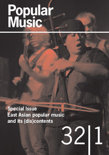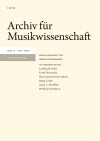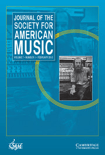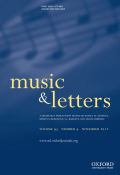
REVUE DE MUSICOLOGIE
Scope & Guideline
Cultivating Knowledge in the Art of Sound
Introduction
Aims and Scopes
- Historical Musicology:
The journal places a strong emphasis on historical musicology, exploring the evolution of music through various periods, including medieval, Renaissance, Baroque, and modern times. - Cultural Contexts of Music:
It investigates the cultural, social, and political factors that shape music practices and reception, such as music's role in national identity, migration, and societal changes. - Interdisciplinary Approaches:
The journal encourages interdisciplinary research that connects musicology with fields like literature, history, anthropology, and digital humanities, facilitating a broader understanding of music's impact and significance. - Music Analysis and Criticism:
A focus on analytical studies of musical works, performance practices, and the theoretical frameworks that underpin music criticism, enabling a deeper appreciation of compositional techniques. - Contemporary Music Studies:
The journal also addresses contemporary issues in music, including popular music studies, ethnomusicology, and the effects of globalization on music traditions.
Trending and Emerging
- Music and Identity:
There is a growing emphasis on the interplay between music and identity, examining how music shapes and reflects personal, community, and national identities, particularly in multicultural contexts. - Digital Humanities in Musicology:
The integration of digital humanities methodologies is increasingly evident, with studies utilizing digital tools for music analysis, archiving, and dissemination, reflecting a modern approach to music scholarship. - Music and Politics:
Research exploring the relationship between music and political movements, including how music serves as a form of resistance or propaganda, is gaining traction, especially in the context of historical and contemporary politics. - Global and Transnational Perspectives:
The journal is expanding its focus on global and transnational music studies, analyzing how music transcends borders and influences cultural exchanges, particularly in the context of migration and diaspora. - Intersections with Other Disciplines:
Emerging themes highlight the intersections of music with other disciplines, such as sociology, anthropology, and cultural studies, fostering a more holistic understanding of music's role in society.
Declining or Waning
- Traditional Music Forms:
Studies focused exclusively on traditional music forms, such as folk music and classical genres, seem to be waning as the journal increasingly embraces contemporary and interdisciplinary approaches. - Eurocentric Perspectives:
There is a noticeable decline in research that strictly adheres to Eurocentric perspectives on music history, as the journal expands its scope to include more global and transnational viewpoints. - Single-Composer Studies:
Research concentrating solely on individual composers or isolated works has decreased, giving way to broader thematic explorations that consider multiple influences and contexts. - Music Pedagogy:
The focus on music education and pedagogy as standalone topics appears to be diminishing, possibly as the journal prioritizes more critical and analytical studies. - Static Historical Narratives:
There is a shift away from static historical narratives that do not consider the dynamic interactions between music and society, as the current trend favors more fluid and interconnected analyses.
Similar Journals

Popular Music
Advancing the Study of Cultural RhythmsPopular Music, published by Cambridge University Press, is a leading academic journal that has been at the forefront of contemporary music studies since its inception in 1981. With its comprehensive scope encompassing a rich diversity of topics within the fields of Cultural Studies and Music, this journal holds a respectable Q2 ranking in both categories as of 2023, underscoring its significant impact on the scholarly discourse surrounding popular music. Researchers, professionals, and students alike will find invaluable insights within its pages as it explores the socio-cultural dynamics of music from various global perspectives. While it is not an open-access journal, the publication aims to foster critical dialogue and interdisciplinary scholarship. Based in the United Kingdom, Popular Music serves as a vital resource for those interested in the intersections of music, culture, and society, sustaining a vibrant academic community through rigorous peer-reviewed articles and reviews. Engage with the latest research and deepen your understanding of popular music's ever-evolving landscape.

ARCHIV FUR MUSIKWISSENSCHAFT
Celebrating the Art and Science of Music ResearchARCHIV FUR MUSIKWISSENSCHAFT, the esteemed journal published by FRANZ STEINER VERLAG GMBH, serves as a significant platform for the dissemination of scholarly research in the field of musicology. With an ISSN of 0003-9292 and an established history of publication reaching back to 2002, this journal aims to explore various aspects of music theory, history, and ethnomusicology, contributing to academic discourse within a vibrant global community. Despite its designation in the Q4 category for music in 2023, the journal continues to foster innovative research and discussions among budding musicians, established academics, and music enthusiasts alike. While Open Access options are not currently available, the journal's offerings are enriched by a thorough review process aimed at maintaining high academic standards. Located in Stuttgart, Germany, at BIRKENWALDSTRASSE 44, D-70191, ARCHIV FUR MUSIKWISSENSCHAFT is committed to engaging its readers through insightful articles and reveals the evolving landscape of music scholarship while remaining a resourceful tool for researchers and students pursuing knowledge in this captivating field.

Journal of the Society for American Music
Advancing Knowledge in American Music and CultureThe Journal of the Society for American Music is a leading academic journal dedicated to the study of American music and its diverse cultural contexts. Published by Cambridge University Press, this journal serves as a vital platform for researchers and professionals in the fields of musicology, ethnomusicology, and American studies, contributing significantly to scholarly discourse and advancing knowledge in these areas. With an impressive impact factor reflecting its academic rigor, it is placed in Q2 of the music category as of 2023 and ranks #55 out of 180 in the Arts and Humanities segment, placing it in the 69th percentile among its peers. Since its inception, the journal has published a wealth of articles, reviews, and critical studies that explore the rich tapestry of American musical traditions from historical and contemporary perspectives. It operates under a subscription model, ensuring a wide distribution and accessibility to its important findings. Researchers, students, and professionals alike will find the journal an essential resource for advancing their understanding of the dynamic landscape of American music.

RIVISTA ITALIANA DI MUSICOLOGIA
Unveiling the Rich Tapestry of Musical KnowledgeRIVISTA ITALIANA DI MUSICOLOGIA, published by the Italian Society of Musicology, is a distinguished journal dedicated to the field of musicology, offering a platform for scholarly research and discourse on a wide array of musical topics. With an ISSN of 0035-6867 and an E-ISSN of 2036-5586, this journal has contributed significantly to the understanding of music in cultural and historical contexts. Although the scope of coverage was marked from 2003 to 2008 in renowned databases like Scopus, the journal continues to serve as an invaluable resource for researchers, educators, and students embroiled in music studies. Its emphasis on rigorous research and critical analysis makes it a vital asset for anyone seeking to deepen their knowledge of musicological inquiry. While not an open-access publication, the RIVISTA ITALIANA DI MUSICOLOGIA remains a prestigious outlet for scholarly contributions that reach audiences eager to explore the complexities of musical heritage.

MUSIKTHEORIE
Bridging Theory and Practice in Music EducationMUSIKTHEORIE is a pivotal journal dedicated to the field of music theory, published by LAABER-VERLAG. With its ISSN 0177-4182, this journal serves as an essential platform for scholars, educators, and practitioners interested in the multifaceted dimensions of music theory. Although it does not currently offer open access, it provides in-depth analyses and critical discourse on theoretical frameworks, compositional techniques, and historical perspectives in music. Despite its coverage in Scopus being discontinued after 2018 and ranking within the 5th percentile of Arts and Humanities - Music, MUSIKTHEORIE remains a respected publication for advancing knowledge and fostering collaboration within the musicological community. Researchers and students alike can benefit from its rich content and the insights shared within its pages.

Musicologica Brunensia
Empowering Scholars in the World of MusicologyMusicologica Brunensia, an esteemed journal published by Masaryk University, Faculty of Arts, serves as a significant platform for the dissemination of knowledge in the field of musicology. Based in the Czech Republic, this Open Access journal has been facilitating scholarly communication since 2009, allowing unrestricted access to its rich array of research articles. With an ISSN of 1212-0391 and an E-ISSN of 2336-436X, Musicologica Brunensia proudly holds a Q3 ranking in the Music category as of 2023, reflecting its dedication to advancing research in the arts and humanities, particularly music. The journal accepts contributions spanning diverse topics within music studies, fostering interdisciplinary dialogue among researchers, professionals, and students alike. Located at Arne Novaka 1, Brno, 60200, Czech Republic, Musicologica Brunensia is poised to continue its journey of promoting innovative scholarship in musicology until 2024 and beyond, making it a valuable resource for anyone passionate about the field.

MUSICAL TIMES
Empowering the Next Generation of Music ScholarsMUSICAL TIMES is a distinguished journal dedicated to the exploration and dissemination of scholarly works in the realm of music, serving as an essential resource for researchers, professionals, and students alike. Published by MUSICAL TIMES PUBLICATIONS LTD, this journal has built a robust reputation within the arts and humanities, specifically focusing on music studies, with an impactful reach indicated by its Scopus ranking at #73 out of 106 in the field. Though access to this journal is not open, its curated content, which spans various facets of musicology and contemporary music discourse, enriches the academic community by encouraging insightful discussions and critical analyses. With its historical roots tracing back to its inception, MUSICAL TIMES aims to foster a deeper understanding of music's cultural, social, and artistic dimensions, making it a valued publication for those engaged in the scholarly pursuit of music.

MUSIC & LETTERS
Engaging with the Sonic and the Written WordMUSIC & LETTERS, published by Oxford University Press, is a prominent academic journal that has been at the forefront of musicology and music studies since its inception in 1920. With an ISSN of 0027-4224 and an E-ISSN of 1477-4631, the journal provides a platform for scholarly articles that explore the rich interplay between music and literature, contributing significantly to the understanding of musical context, form, and societal impact. As of 2023, it holds a respectable Q3 rank in Music within its category, positioned at Rank #66 out of 180 in the Scopus Arts and Humanities Music category. Despite not being an Open Access journal, its rigorous peer-review process and commitment to high-quality research make it an essential resource for researchers, professionals, and students alike. The journal's scope encompasses various genres and historical periods, ensuring a comprehensive examination of music's role in culture and community, thereby enhancing the scholarly discourse within this vibrant field. Based in the United Kingdom, at Great Clarendon St, Oxford OX2 6DP, England, MUSIC & LETTERS continues to inspire and inform the global music scholarly community.

Muzikoloski Zbornik
Celebrating Diverse Voices in MusicologyMuzikoloski Zbornik is a prominent open-access journal in the field of musicology, published by the esteemed University of Ljubljana Press since 1965. Hailing from Slovenia, this journal has been dedicated to advancing the study of musical heritage, theory, and practice, serving as a vital platform for researchers, professionals, and students alike. With a notable Q2 category ranking in the field of music and a Scopus ranking of 109 out of 180 in Arts and Humanities, Muzikoloski Zbornik showcases high-quality research, fostering discourse and collaboration among scholars globally. The journal embraces a diverse range of topics, from ethnomusicology to music education, ensuring its relevance in an ever-evolving academic landscape. By providing unrestricted access to its content, it champions the dissemination of knowledge and supports the growth of the musicology discipline.

Musicology Today
Elevating Music Scholarship to New HeightsMusicology Today, published by SCIENDO, is a pivotal journal in the field of musicology, presenting a platform for scholars, researchers, and practitioners to disseminate their findings and engage with current trends in music research. With its ISSN 1734-1663 and E-ISSN 2353-5733, the journal aims to provide a comprehensive overview of various aspects of music, including theory, history, and ethnomusicology, fostering a multidisciplinary dialogue among its contributors. Located in Warsaw, Mazovia, Poland, this journal is not only committed to high academic standards but also to promoting open access to knowledge, thereby enhancing accessibility for a global audience. As it continues to bolster its reputation in the academic community, Musicology Today plays an essential role in shaping the future of music scholarship and invites the engagement of seasoned researchers and emerging voices alike.